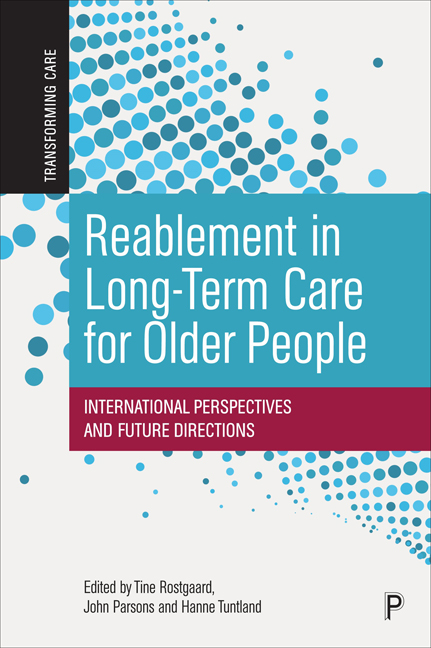9 - Better care, better work? Reablement in Danish home care and the implications for care workers
Published online by Cambridge University Press: 18 January 2024
Summary
Introduction
As covered elsewhere in the book, reablement has been introduced with the aim of improving functioning in daily activities for older people, and has implications for clients and their informal caregivers. However, it also has implications for formal care workers with respect to changing the aims and nature of their work, as well as introducing collaboration across different disciplines. The introduction of reablement could therefore potentially affect how attractive it is to work in the sector. This is highly relevant in an ageing world, where demographic changes are increasing the need for staff in the long-term care (LTC) sector as populations and the care workforce are ageing. There is currently a ratio of five LTC workers for every 100 people aged 65+ in the OECD countries, which extrapolates to an additional 13.5 million workers by 2040 (OECD, 2020). However, LTC work is generally characterised by insufficient staffing, poor working conditions, and low status and pay. The sector suffers from recruitment problems, high turnover, and subsequent staffing shortages, which will likely worsen soon. Attracting and retaining workers in the LTC sector is therefore a common concern in OECD countries (OECD, 2020), and reablement may be one solution to this.
This chapter primarily focuses on what the implications of the introduction of reablement are for home care workers, in the setting of Denmark where reablement has been implemented in home care since 2007. The chapter first investigates how reablement may affect care workers’ approach to their work and what they consider to be good care, and the chapter thereafter considers the implications for how attractive they find the sector. Interview data from two municipalities and data from a national survey among care workers are applied. The results reveal how a common understanding has been established within the home care organisations: that furthering client self-reliance makes for more cost-effective interventions while also increasing their quality of life. Reablement appears to provide care workers with more professional autonomy and flexibility in the planning of their work while they also receive more support and attention from managers. The applied tasks and methods focus particularly on motivating the clients towards achieving such independence, and the reablement care workers find this both meaningful and professionally rewarding to the degree that they seem to be less likely to want to quit their job.
- Type
- Chapter
- Information
- Reablement in Long-term Care for Older PeopleInternational Perspectives and Future Directions, pp. 189 - 216Publisher: Bristol University PressPrint publication year: 2023



